A CPU cooler is a device that is designed to dissipate heat generated by the CPU to keep its temperature below the design limit. So, a dedicated cooler is attached to all kinds of CPUs, whether inside a laptop, a gaming console, or a desktop computer. The CPU is one of the most important components of a computer, and it generates a significant amount of heat while processing data. Here are some things about a CPU cooler you should know before buying one.
- Noise Level: The CPU coolers are essentially cooling devices with various moving parts to dissipate heat the CPU generates properly. So as a result, almost all CPU coolers generate some noise that you can hear coming out of your cabinet. But, with new and advanced options, the noise level of CPU coolers is getting lower and lower with every new model. Right now, you can easily find CPU coolers that operate under a noise level of 30 dB, or even lower.
- Type of Cooling: Even for CPU coolers, you have 2 different choices: air coolers and liquid coolers. As you may have guessed, liquid coolers use a liquid cooler with indirect contact for heat dissipation for an increased heat transfer rate compared to an air cooler. While such coolers are much more efficient, they are also a lot more expensive and the additional cooling performance may not even be necessary for basic performance. So, you should choose the type of CPU cooler which suits your system type the best.
- Socket Compatibility: The most important factor of a desktop CPU cooler is its socket compatibility. This factor ensures the compatibility of the CPU with your CPU model as well as the motherboard itself. Now that you are looking for a CPU cooler for Intel 13th Gen CPUs, you need to pick an option that is compatible with the Intel LGA 1700 socket. But, having additional socket compatibility also enables you to use the same cooler with different CPU models.
The CPU cooler is used to prevent the CPU from overheating, which can cause system instability, crashes, and even permanent damage to the CPU. The only advantage with desktop CPUs is that you have the option to choose the CPU cooler of your choice which suits your cooling requirements most efficiently. So, we have brought you this list of the best CPU coolers that you can find on the market right now. We also have a “Buying Guide” for the best CPU coolers that contains all the information you will need while comparing 2 or more CPU coolers.
Outline
ToggleBest CPU Coolers For Intel 13th Gen CPUs Chart
| CPU Coolers For Intel 13th Gen CPUs | Noise Level (dB) | Type of Cooling | Compatible Sockets | Buy Now |
|---|---|---|---|---|
| Cooler Master CPU Cooler | 15 | Liquid | LGA - 1700, 1200 AMD - AM5, AM4 | Check On Amazon |
| CORSAIR CPU Cooler | 10 | Liquid | LGA - 1700, 1200 AMD - AM5, AM4 | Check On Amazon |
| MSI CPU Cooler | 16.7 | Liquid | LGA - 1700, 1200 AMD - AM5, AM4 | Check On Amazon |
| ARCTIC CPU Cooler | 10.64 | Liquid | LGA - 1700, 1200 AMD - AM5, AM4 | Check On Amazon |
| Vetroo CPU Cooler | 30.8 | Liquid | LGA - 1700, 1200 AMD - AM5, AM4 | Check On Amazon |
| ID-COOLING CPU Cooler | 35.2 | Liquid | LGA - 1700, 1200 AMD - AM5, AM4 | Check On Amazon |
| be quiet! CPU Cooler | 24.3 | Fans (Air) | LGA - 1700, 1200 AMD - AM5, AM4 | Check On Amazon |
| Noctua CPU Cooler | 19.2 | Fans (Air) | LGA - 1700, 1200 AMD - AM5, AM4 | Check On Amazon |
Best CPU Coolers For Intel 13th Gen CPUs Reviews
1. Cooler Master CPU Cooler
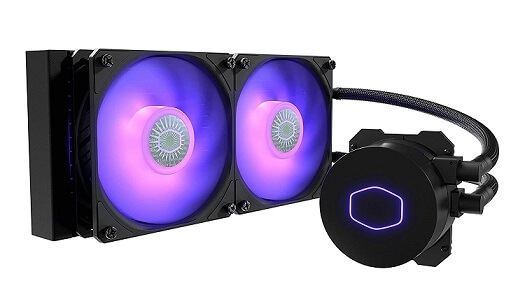 You are probably aware of the brand CoolerMaster since it is one of the most popular suppliers for computer accessories. Apart from its cabinets and power supply units, it also has a wide range of CPU coolers worth checking out.
You are probably aware of the brand CoolerMaster since it is one of the most popular suppliers for computer accessories. Apart from its cabinets and power supply units, it also has a wide range of CPU coolers worth checking out.
In the 1st place, we have the CoolerMaster MasterLiquid ML240L RGB V2 CPU cooler. This is one of the budget liquid AIO CPU coolers from CoolerMaster, which is also one of the best-performing units on the market. This CPU cooler is paired with a 240 mm radiator which consists of 2 120 mm fans for efficient cooling performance. Also, it is run by a Gen3 dual chamber pump for an increased fluid flow rate.
Coming to the compatibility, this CPU cooler is suitable for Intel LGA 1200 and 1700 CPU socket. But it also supports AMD’s AM4 and AM5 CPU sockets for additional coverage. Even though it is a budget choice, CoolerMaster did not compromise on the overall build quality of this unit. It is made up of industrial-grade seal EPDM material for long-lasting reliability. The fans of this CPU cooler operate at about 1800 RPM and fall under a 15 dB noise level.
Best Features
- The CPU cooler has a noise rating of 15 dB
- This is a liquid CPU cooler
- Compatible with LGA 1200,1700 & AMD AM4, AM5 CPU sockets
- 1800 RPM cooling fan speed
Pros
- Most popular choice for a CPU cooler right now
- Relatively cheaper liquid CPU cooler
- Works with both AMD and Intel CPUs
Cons
- The radiator only has 2 fans
2. CORSAIR CPU Cooler
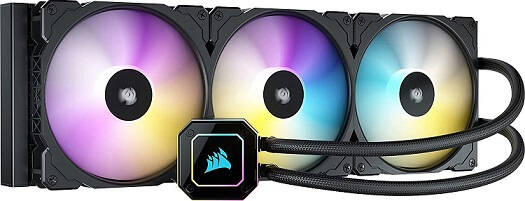 Corsair is one of the most popular PC accessories brands on the market right now, and a lot of custom PC build enthusiasts prefer components made by Corsair, especially for a gaming PC build. Therefore, we are choosing a Corsair CPU cooler or the next position.
Corsair is one of the most popular PC accessories brands on the market right now, and a lot of custom PC build enthusiasts prefer components made by Corsair, especially for a gaming PC build. Therefore, we are choosing a Corsair CPU cooler or the next position.
The 2nd choice for the best CPU coolers is the CORSAIR iCUE H170i ELITE CAPELLIX Liquid CPU Cooler. This is also a pretty powerful option on the market right now, considering it comes with a 420 mm radiator for enhanced cooling levels. The radiator consists of 3 130 mm fans operating at about 2000 RPM to offer the best cooling performance. So, if you are picking up a CPU cooler for an overclocked 13th Gen Intel CPU, this is the perfect choice for a liquid CPU cooler.
Even with such high specifications, this CPU cooler offers a noise rating of 10 dB, making it the most silent option on our list. All 3 fans on this radiator are RGB fans controlled by the Corsair iCUE software. With that, you can easily sync the RGB illumination of the fan with other components of your system and create a beautiful illumination with animation. This option is also compatible with all the latest Intel and AMD CPUs without any problem.
Best Features
- The CPU cooler has a noise rating of 10 dB
- This is a liquid CPU cooler
- Compatible with LGA 1200,1700 & AMD AM4, AM5 CPU sockets
- 2000 RPM cooling fan speed
Pros
- Supports Corsair iCUE RGB illumination
- Cooling performance is better than many other choices
- Noise rating is very low
Cons
- Considerably expensive than most other liquid coolers
3. MSI CPU Cooler
 MSI is also a pretty famous brand when it comes to PC accessories, especially the ones that are aimed for a gaming PC build. You will also find GPUs, PSUs, cabinets, and many other MSI components with a gaming theme.
MSI is also a pretty famous brand when it comes to PC accessories, especially the ones that are aimed for a gaming PC build. You will also find GPUs, PSUs, cabinets, and many other MSI components with a gaming theme.
For the 3rd place, we are picking up the MSI MAG CoreLiquid 360R V2, another high-profile liquid CPU cooler on this list. This is also a triple fan liquid cooler with a 360 mm radiator and 3 120 fans. Both the radiator and the CPU cooling unity come with an incredible design that makes it an ideal choice for a gaming PC build. On top of that, the radiator of the CPU cooler also has RGB fans for extra aesthetic points.
You also get to rotate the water within a 270-degree water block to make the cooler adjust according to your motherboard orientation. The split flow radiator with the integrated pump on this CPU cooler is also made of aluminum, which offers superior durability and corrosion resistance. Plus, the 400 mm water cooling tubes of these CPU coolers ensure evaporation-proof performance with triple-layered plastic concealing.
Best Features
- The CPU cooler has a noise rating of 16.7 dB
- This is a liquid CPU cooler
- Compatible with LGA 1200,1700 & AMD AM4, AM5 CPU sockets
- The RPM range is 500 to 2000 RPM
Pros
- 400 mm water cooling tubes
- Aluminum radiator with ARGB fans
- Very silent CPU cooler with powerful specifications
Cons
- Power consumption is higher than other choices
4. ARCTIC CPU Cooler
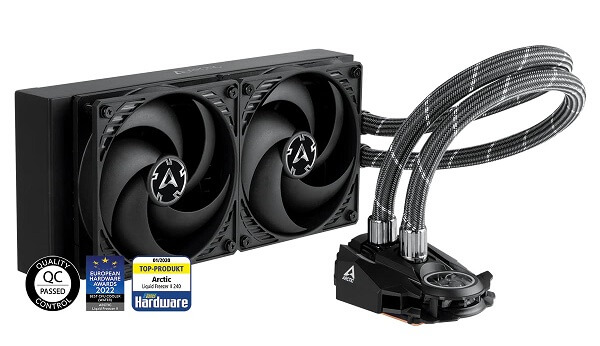 If you have ever looked around for a thermal paste replacement for your CPU cooler, you must have come across a couple of options from the brand ARCTIC. Apart from that, ARCTIC also makes highly efficient CPU coolers that are also budget-friendly.
If you have ever looked around for a thermal paste replacement for your CPU cooler, you must have come across a couple of options from the brand ARCTIC. Apart from that, ARCTIC also makes highly efficient CPU coolers that are also budget-friendly.
Up next, we have the ARCTIC Liquid Freezer II 240, which is yet another budget choice on our list for a liquid CPU cooler. This is also an AIO CPU cooler that comes with not only 2 dedicated cooling fans on the radiator but also a compact fan on the CPU block as well for even faster heat dissipation. The additional 40 mm VRM manages to keep the CPU nearly 15°C lower than other liquid CPU coolers.
Another great thing about the CPU cooler is its integrated sleeved tubing. Therefore, the cooler does not cause any problems with cable management, and it also reduces the possibility of fluid leakage. With smart load management, the CPU cooler can automatically operate at lower power with nearly 80% lower power consumption. Despite being the cheaper option, it still has 6 years of warranty, which you get with premium options.
Best Features
- The CPU cooler has a noise rating of 10.64 dB
- This is a liquid CPU cooler
- Compatible with LGA 1200,1700 & AMD AM4, AM5 CPU sockets
- It has 6 years of warranty
Pros
- All in one liquid CPU cooler
- Works between 200 to 1800 RPM speed range
- Additional 40 mm fan on the PCU block
Cons
- Other options have better radiators
5. Vetroo CPU Cooler
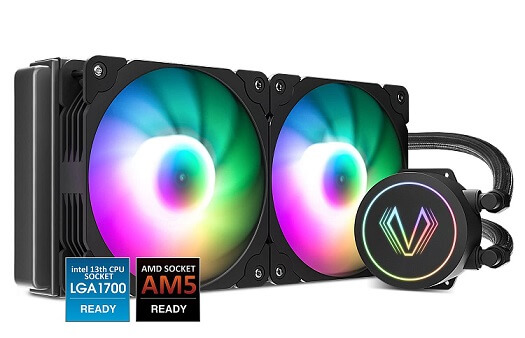 While we are discussing budget choices, we have a couple more options for liquid CPU coolers which are relatively cheaper than even some air coolers right now. Vetroo also has one such option which can be perfect for budget-focused gaming PC builds.
While we are discussing budget choices, we have a couple more options for liquid CPU coolers which are relatively cheaper than even some air coolers right now. Vetroo also has one such option which can be perfect for budget-focused gaming PC builds.
The Vetroo V240 Liquid CPU Cooler is yet another highly affordable choice on our list today that you can prefer for a budget gaming PC build. It has a 240 mm radiator with dual 120 mm fans, offering a TDP rating of 250 Watts. This CPU cooler is specifically designed for Intel’s LGA 1200, 1700, 115X, and AMD’s AM4 and AM5 CPU sockets. And to make your system look appealing, it also comes with addressable RGB synchronization that you can customize very easily.
The dual PWM fans on the radiator of this AIO CPU cooler also support adjustable fan speed so that you can use the CPU cooler without worrying about excessive noise. This CPU cooler can work below the 30.8 dB noise level, which is still slightly louder than most other options, but it should not be a problem for casual usage.
Best Features
- The CPU cooler has a noise rating of 30.8 dB
- This is a liquid CPU cooler
- Compatible with LGA 1200,1700 & AMD AM4, and AM5 CPU sockets
- 250 Watts TDP rating
Pros
- One of the cheapest options for a liquid CPU cooler
- 800 to 1800 RPM fan speed range
- Addressable RGB lighting
Cons
- It is comparatively louder than other CPU coolers
6. ID-COOLING CPU Cooler
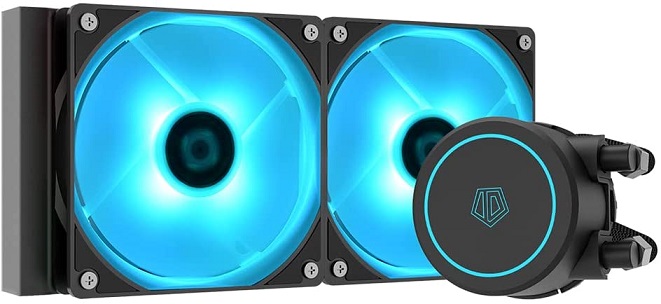 ID-COOLING has also made it possible to introduce an AIO liquid CPU cooler into a budget PC build with its highly affordable CPU cooler models. The following option from ID-COOLING is also a great option that is trusted by thousands.
ID-COOLING has also made it possible to introduce an AIO liquid CPU cooler into a budget PC build with its highly affordable CPU cooler models. The following option from ID-COOLING is also a great option that is trusted by thousands.
The ID-COOLING AURAFLOW X 240 is yet another cheaper option that we have picked up for our list, and you will surely find it ideal for a wide range of applications. Most importantly, this is a liquid CPU cooler, so you can prefer this option for high-performance CPUs like the 13th Gen Intel CPUs without any problem. This CPU cooler comes with a dual fan radiator which consists of 2 120 mm fans that work at about 1700 RPM for efficient cooling performance.
The ID-COOLING AURAFLOW X 240 can also be adjusted to work at 700 RPM fan speed to avoid excessively loud noise. Still, you will detect some response from the CPU cooler as it has a noise rating of 35.2 dB which is a bit higher than what you get with other options. Even though it is a budget option, you will still find pretty attractive RGB lighting on this radiator which makes it a preferable option for many buyers.
Best Features
- The CPU cooler has a noise rating of 35.2 dB
- This is a liquid CPU cooler
- Compatible with LGA 1200,1700 & AMD AM4, AM5 CPU sockets
- Comes with a 240 mm radiator
Pros
- Cheapest AIO liquid cooler right now
- Comes with dual 120 mm fans
- RGB illumination for better aesthetics
Cons
- The noise rating should have been lower
7. be quiet! CPU Cooler
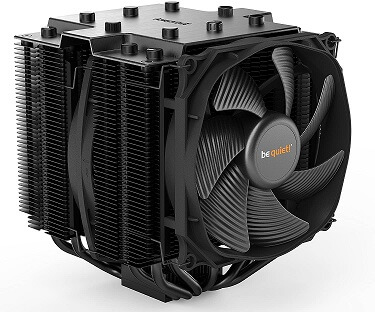 Now that you are familiar with all liquid CPU coolers on the market, let us talk about what you can get for an air CPU cooler right now. In a lot of cases, a liquid cooler is not a feasible choice due to compact space. For such uses, air coolers like the one made to be quiet! will be perfect.
Now that you are familiar with all liquid CPU coolers on the market, let us talk about what you can get for an air CPU cooler right now. In a lot of cases, a liquid cooler is not a feasible choice due to compact space. For such uses, air coolers like the one made to be quiet! will be perfect.
The be quiet! Dark Rock Pro 4 is the first air cooler that we have chosen for this list of the best CPU coolers that you can pair with a high-performance Intel 13th Gen CPU right now. Even though this is an air cooler, it has a TDP rating of 250 Watts, and it works below a noise rating of 24.3 dB which is quite low for an air cooler. You can use this cooler with Intel LGA 12700, 1700, 2066, 1151, and many other socket types, as well as the AM5 and AM4 AMD sockets.
The CPU cooler consists of 2 virtually silent PWM fans which manage to keep uniform heat dissipation from the CPU without excessive noise. And to further improve the heat transfer rate, the heatsink of the CPU cooler is connected to the CPU block via 7 high-performance copper heat pipes. The fins of the heatsink are also highly optimized to ensure better airflow, which increases the performance of the CPU.
Best Features
- The CPU cooler has a noise rating of 24.3 dB
- This is an air CPU cooler
- Compatible with LGA 1200,1700 & AMD AM4, AM5 CPU sockets
- It has a 250 Watts TDP rating
Pros
- Heatsink performance is very good
- Up to 2500 RPM maximum fan speed
- Very low noise level considering its an air CPU cooler
Cons
- Not as efficient as premium AIO liquid coolers
8. Noctua CPU Cooler
 We all know Noctua as it is the leading supplier right now for high-performance CPU coolers and cabinet fans. Despite the high CFM rating, Noctua somehow manages to keep the noise rating of the fans very low.
We all know Noctua as it is the leading supplier right now for high-performance CPU coolers and cabinet fans. Despite the high CFM rating, Noctua somehow manages to keep the noise rating of the fans very low.
The Noctua NH-D15 chromax.Black is our final choice for the best CPU cooler that you can use with an Intel 13th Gen CPU right now. This is a premium-range air cooler that will allow you to have enhanced cooling performance on your system without needing additional power requirement or installation space, which is necessary for an AIO cooler. This CPU cooler comes with an extra-wide 140 mm dual tower heatsink design that allows you to install 2 Noctual fans for ultimate cooling performance.
The heat sink also consists of 6 heat pipes which manage to take the cooling performance of this unit on par with that of the budget range AIO liquid CPU coolers. The CPU cooler also comes with the high-end NT-H1 thermal paste from Noctua and the SecuFirm2 mounting system for quick and secure CPU cooler installation. But even with these features, the best feature of the Noctua NH-D15 chromax.Black is its 19.2 dB noise rating which is the least you are going to get on an air CPU cooler right now.
Best Features
- The CPU cooler has a noise rating of 19.2 dB
- This is an air CPU cooler
- Compatible with LGA 1200,1700 & AMD AM4, AM5 CPU sockets
- 1500 RPM maximum fan speed
Pros
- Offers similar cooling performance as budget liquid coolers
- Allows installation of 2 fans for enhanced cooling performance
- Noise rating is very low for an air cooler
Cons
- Slightly expensive choice for an air CPU cooler
Buying Guide For The Best CPU Coolers For Intel 13th Gen CPUs
You may already know that you will have to pair your CPU with a dedicated CPU cooler, whether it is an air-cooler, a liquid cooler, or at least the stock cooler that ships with the CPU in order to use the CPU. Without a CPU cooler, you will most probably end up with a system crash within just 5 to 10 minutes of turning ON your system, that is if the system turns on to begin with.
Since CPUs generate intense heat when they are operational, the CPU coolers become a crucial accessory of your PC build which is necessary for its functionality. For gaming PC builds, the importance of the CPU coolers is even higher since new-gen games are quite heavy on the CPU, making them operate at higher temperature levels. So, if you are also looking for a decent 3rd party CPU cooler, you should first check out these important factors of a CPU cooler and then decide which option is right for you.
1. Noise level
For any PC component that comes with a fan, there is bound to be some level of noise generated by the component, and the CPU coolers are no exception. On all CPU coolers, you will find a certain noise level rating which is the highest noise level that you should expect from the cooler. Naturally, a noisy CPU cooler can be distracting and annoying, particularly if you spend a lot of time using your computer. The noise can make it difficult to concentrate, and it can interfere with activities like watching videos or listening to music. So, a lot of buyers are going for a silent CPU cooler that has a noise rating of 30 dB or lower. If you are also concerned about the noise levels, don’t be. For this list, we have only picked the most silent choices for CPU coolers, some of which offer noise ratings of as low as 10 dB.
2. Type of Cooling
There are mainly 2 types of cooling technologies that are used with desktop PC systems, that are air and liquid cooling. The same goes for CPU coolers as well. Air coolers are the most common and affordable type of CPU coolers. These coolers typically consist of a heatsink and a fan. The heatsink is made of metal and has fins that help to dissipate heat.
In this case, the heat is transferred to the heatsink from the CPU and then extracted with the help of the fan. While some coolers work with a single fan, some coolers allow dual fan installation for even better CPU cooling. But for overclocked CPUs, normal air coolers can’t offer enough heat transfer rates. In such a case, you must get a liquid CPU cooler.
Liquid coolers use a liquid coolant such as water or water-glycol mixture to transfer the heat from the CPU. The coolant is circulated through a loop that consists of a pump, a radiator, and a block that attaches to the CPU. The pump pushes the coolant through the loop, which passes through the radiator, where the heat is dissipated outside by fans. While liquid coolers are considerably expensive, the cooling performance of such coolers is certainly much better than that of air coolers. So, liquid coolers are more suitable for overclocked CPUs and high-end gaming PC builds.
3. Compatible Sockets
socket compatibility is the most crucial factor for a CPU cooler as it dictates whether you can install the CPU cooler on your CPU or not. So even if you are paying for the most high-end CPU cooler on the market, it will be of no use to you if it is not compatible with your system. As you may already know, each CPU has a specific socket type, and the cooler must be compatible with that socket type. If the cooler is not compatible with the CPU socket, it cannot be installed properly, and it will not be able to cool the CPU effectively.
In addition to the CPU socket, the motherboard also has a specific socket type. The CPU cooler must also be compatible with the motherboard socket as well to ensure proper installation. So, the socket compatibility of the CPU cooler affects both the CPU and motherboard compatibility. Since we are focusing on CPU coolers designed for the Intel 13th Gen CPUs, we have only picked up the options that support the Intel LGA 1700 socket. Some options also offer additional compatibility with the help of extra accessories, making the cooler much more versatile.
4. Material
The material used to make a CPU cooler can have a significant impact on its cooling performance, durability, and cost. Most importantly, the material of the heatsink affects the thermal conductivity of the contact part of the cooler with the CPU, thus affecting the overall performance of the cooler. Right now, Copper and aluminum are two of the most common materials used for a CPU cooler’s heat sink because they have high thermal conductivity.
Another factor that you need to keep in mind is corrosion resistance if you are looking for a liquid cooler. Corrosion resistance is also important for CPU coolers because they are often exposed to moisture and other corrosive elements. Copper and aluminum also have very good corrosion resistance, but copper is generally more resistant than aluminum. Lastly, the material used for the CPU cooler affects the weight of a CPU cooler. A heavier cooler may provide better cooling performance, but it can also put stress on the motherboard and increase the risk of damage.
5. RPM
Last but not least, we will suggest you check out the maximum RPM rating that you will usually find with both air as well as liquid CPU coolers. For air coolers, the RPM represents the speed of the fan connected to the heatsink, whereas the same for a liquid CPU cooler is for the fans installed on the radiator. The fan RPM directly affects the cooling performance of the CPU cooler. The faster the fan spins, the more air it can move through the heatsink, which increases the cooling capacity of the cooler.
A higher RPM can be beneficial for CPUs that generate a lot of heat, such as high-end gaming CPUs or CPUs that are overclocked. However, as it goes with all moving parts, a faster fan will also most probably increase the noise level of the CPU cooler. So unless you can find a CPU cooler that ensures both a low noise rating along with a high RPM fan, it would be wise to prefer a standard 500 to 1000 RPM CPU cooler. Another important thing to keep in mind here is that high RPM fans also increase the overall power consumption of the CPU cooler.
CPU Cooler FAQs
Ans: Yes, all Intel 13th Gen CPUs ship with an Intel Laminar RM1 stock CPU cooler. While this CPU cooler is highly effective for this range of CPUs, a lot of buyers prefer to go with an external CPU cooler for increased cooling performance. The main reason behind that is the fact that stock CPU coolers are not designed to handle the increased CPU temperatures caused by overclocking. Therefore, it is better to go with a 3rd party air or liquid cooler with your Intel 13th Gen CPU which ensures better performance than the stock cooler.
Ans: The most suitable type of cooler for your CPU completely depends upon your system usage. If you are installing the 13th Gen CPU on a work computer that handles the minimal load, then you probably don’t even need a 3rd party cooler at all. On the other hand, for a gaming computer or a workstation PC build, you will need a 3rd party cooler and you should prefer a liquid cooler over an air cooler if you are also planning to overclock your CPU. Without overclocking, you will find a lot of CPU coolers that will turn out to be perfectly fine for your CPU.
Ans: All Intel 13th Gen CPUs require an Intel LGA 1700 CPU socket on the motherboard. So, your CPU coolers must also support the LGA 1700 socket if you wish to pair it with a 13th Gen Intel CPU. Fortunately, almost all 3rd party CPU cooler brands manufacture CPU coolers with a wide range of CPU socket compatibility which makes the installation of the unit very easy. These options are also shipped with additional installation accessories which makes it possible to use the same cooler with different motherboards and CPUs with minimal changes in the installation process.
Conclusion
We hope that you are not fully aware of all the important factors that affect the installation and compatibility of a CPU cooler and make it possible to choose the perfect option for your PC build. If yes, then you can now proceed with our selection of the best CPU coolers and pick up the best option that suits your requirements the best. On this list, we have included a wide range of options so that you will find an ideal option for all budget ranges and performance requirements. You can easily find a suitable CPU cooler for an entry-level PC build as well as a top-of-the-line PC build without any problem. If you have any doubts about the features or specifications of the CPU coolers, you can check out our buying guide for the best CPU coolers and refer to the information present there to analyze the product properly. In the end, we have also picked up some decent choices for you so that you can quickly find the most compatible option for your PC build.
- With a lot of new companies on the market offering CPU coolers, there is a lot to look forward to when it comes to budget options. You can also find pretty cheap liquid CPU coolers like the ID-COOLING CPU Cooler. Paired with a 240 mm radiator, this AIO CPU cooler manages to offer a very silent performance with a 35.2 dB noise level rating. And with that, it also offers a maximum airflow rating of about 74.5 CFM, which is quite high for a liquid CPU cooler. As for its compatibility, this CPU cooler model goes with Intel 13th Gen CPUs with LGA 1700 socket compatibility along with added support for AMD AM4 and AM5 sockets as well.
- But, when it comes to powerful PC builds where you can’t expect low working temperatures, you should go with similarly powerful CPU coolers like the CORSAIR CPU Cooler. This is the most powerful liquid cooler on our list that comes with a triple fan 420 mm radiator. But, the most interesting factor of this CPU cooler is its 0 RPM fan, offering an extremely silent performance. This ensures a noise rating of a mere 10 dB on the CPU cooler. And when the system is under heavy load, the fans can work at up to 2000 RPM to maintain efficient cooling levels.
- For a lot of PC builds, it is not possible to implement an AIO cooling solution due to compact spaces. In such a case, the Noctua CPU Cooler can be the better alternative. As we all know, Noctua offers industry-leading CPU cooling fans that offer high RPM with an extremely low sound profile. The same goes with this CPU cooler which works under a 19.2 dB noise level. The heat sink of this air cooler consists of 6 heat pipes in total with a dual-fan design for even better cooling performance. You will also get 6 years of warranty on the CPU cooler, making it a fine choice for the long term.

